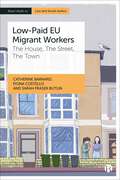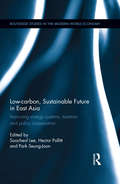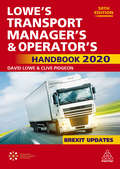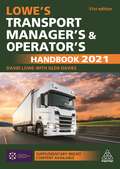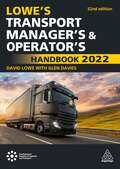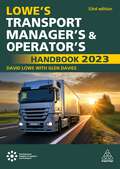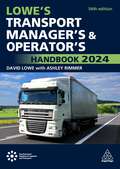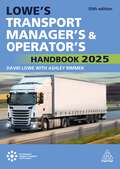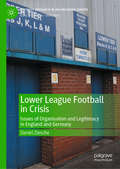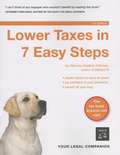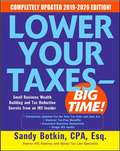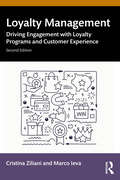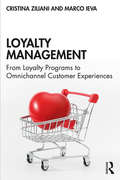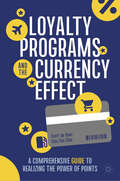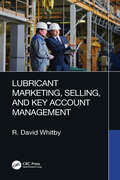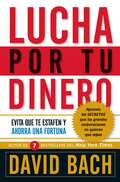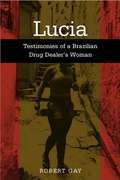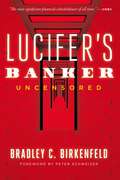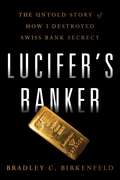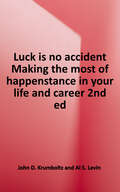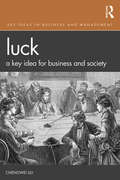- Table View
- List View
Low-Paid EU Migrant Workers: The House, The Street, The Town (Bristol Studies in Law and Social Justice)
by Catherine Barnard Sarah Fraser Butlin Fiona CostelloAvailable open access digitally under CC-BY-NC-ND licence. This book offers an in-depth exploration of the lives of EU migrant workers in the UK following Brexit and COVID-19. Drawing on a longitudinal study, the book delves into the legal problems migrant workers face and sheds much-needed light on the hidden interactions between the law and communities around issues such as employment, housing, welfare and health. Through personal narratives and insights gathered from interviews, it reveals how (clustered) legal problems arise, are resolved and often bypass formal legal resolution pathways. This is an invaluable resource that provides a rich picture of everyday life for migrant workers in the UK and highlights the vital role of NGOs working to support them.
Low-carbon, Sustainable Future in East Asia: Improving energy systems, taxation and policy cooperation (Routledge Studies in the Modern World Economy)
by Hector Pollitt Soocheol Lee Park Seung-JoonEast Asia is a key region in the global economy, including both the second and third largest global economies already and, led by China, continuing to expand at a rapid rate. This economic growth has led to unprecedented gains in prosperity in the region but it has also led to increasing environmental pressures and energy issues. This book assesses ways in which East Asia can continue or even increase existing rates of economic growth while at the same time reducing greenhouse gas emissions and other environmental degradation. Using advanced modelling approaches, future scenarios for four East Asian countries are assessed in detail, including analysis of particular challenges in each country (e.g. coal power in China, nuclear power in Japan). Prospects for each country’s energy system are assessed in detail and the potential effects of various types of Environmental Tax Reform in the four countries are also considered carefully. The final section of the book explores the interaction between trade liberalization, a key driver of growth, and emission levels in the East Asia region.
Lowe's Transport Manager's and Operator's Handbook 2020
by David Lowe Clive PidgeonNow in its 50th edition, Lowe's Transport Manager's and Operator's Handbook 2020 is the most comprehensive guide available to the operational rules and guidelines governing the UK, Ireland and the EU's road transport operators. This best-selling handbook is an essential reference and explores in detail the most pressing issues in today's road transport industry. It includes details on professional competence, insurance, international transport of animals, dangerous and perishable goods, international haulage and customs procedures. This manual includes guidance for drivers in the Republic of Ireland and mainland Europe, along with the rules and penalties governing these regions.Lowe's Transport Manager's and Operator's Handbook 2020 is the essential reference source for any transport manager, fleet operator, owner-driver haulier or student involved in the transport industry. This new edition has been thoroughly updated and revised to reflect the latest developments, covering changes to EU drivers' hours, HM Customs, tachograph rules for AETR rules and intermodal freight material.
Lowe's Transport Manager's and Operator's Handbook 2021
by David LoweSupplementary Brexit Trade and Cooperation Agreement Content Available. See inside first page/back cover of the book for access details. Maintain your understanding of the rules governing road transport operators in the UK, Ireland and Europe to ensure the safe and legal operation of your fleet.Lowe's Transport Manager's and Operator's Handbook 2021 is the complete guide to the operational rules and guidelines governing the UK, Ireland and the EU's road transport operators. Written and designed for transport managers, fleet operators, owner-driver hauliers and those working in the sector, this book contains all the relevant and technical detail required to run a compliant, safe and efficient transport operation.Now in its 51st edition Lowe's Transport Manager's and Operator's Handbook 2021 remains an essential resource to stay informed on the most pressing issues facing the transport industry. It covers all aspects relating to goods vehicles and their operators from vehicle registration, maintenance and load management (including abnormal and dangerous loads) to professional competence, operator training and driver testing. Road traffic law is explained alongside how to ensure safety on the road and at work. Meeting operating standards, keeping up to date with the latest industry changes and complying with the law, all while running sustainable transport operations, has never been simpler with the help of this guide.
Lowe's Transport Manager's and Operator's Handbook 2022
by David Lowe Glen DaviesThe United Kingdom has experienced the biggest changes to its freight and transport regulations in a lifetime. Understand the complete rules and processes governing the UK's road transport operators with this guide, including those that have changed with Brexit. Lowe's Transport Manager's and Operator's Handbook 2022 offers a complete overview of the operational rules and guidelines governing the UK's road transport operator. This book contains all the relevant legal and technical information required to run a compliant, safe and efficient transport operation. It includes all the latest changes to the rules and processes, including those governing the transportation of goods between Great Britain and the EU following Brexit.This fully updated 52nd edition remains an essential resource for transport managers, fleet operators, owner-driver hauliers and those working in the sector. It covers all aspects relating to goods vehicles and their operators from vehicle registration, maintenance and load management (including abnormal and dangerous loads) to professional competence, operator training and driver testing. Road traffic law is explained alongside how to ensure safety on the road and at work. Meeting operating standards, keeping up to date with the latest industry changes and complying with the law, all while running sustainable transport operations, has never been simpler with the help of this guide.
Lowe's Transport Manager's and Operator's Handbook 2023
by Glen DaviesLowe's Transport Manager's and Operator's Handbook 2023 provides a complete overview of the operational guidance governing the UK's road transport operators.With the uncertainty of technological advancement, post-Brexit trade arrangements and various industry crises, it is essential for the UK's road transport operators to have a firm grasp of the processes, rules and regulations that govern their industry. This fully updated 53rd edition covers all aspects of transport legislation relating to goods vehicles and their operators from vehicle registration, maintenance and load management to professional competence, operator training and driver testing. Road traffic law is explained alongside how to ensure safety on the road and at work.Meeting operating standards, keeping up to date with the latest industry changes and complying with the law, all while running sustainable transport operations, has never been simpler with the help of Lowe's Transport Manager's and Operator's Handbook 2023. It is an essential resource for transport managers, fleet operators, owner driver haulers and those working in the industry looking to ensure operational stability and legislative compliance in a turbulent environment.
Lowe's Transport Manager's and Operator's Handbook 2024
by David LoweLowe's Transport Manager's and Operator's Handbook 2024 offers crucial guidance on changes within the transport and haulage industry, providing a clear and concise approach to complex rules, processes and regulations affecting practitioners within the sector.This fully updated 54th edition outlines important legal and technical information so that transport managers, fleet operators, hauliers and practitioners can ensure they remain compliant while navigating a continuously evolving sector. Covering the latest changes to UK guidelines, this indispensable guide includes an essential overview of new operational rulings, up-to-date regulatory decisions and key aspects of transport legislation. Lowe's Transport Manager's and Operator's Handbook 2024 is a vital source for those wanting to ensure professional competence and operational stability. From driver testing and training, road traffic law and vehicle maintenance to Brexit-led changes and technological advancements, this highly regarded guide remains an essential resource for ensuring the safe and efficient operation of today's transport industry.
Lowe's Transport Manager's and Operator's Handbook 2025
by David Lowe Ashley RimmerThis vital resource offers crucial guidance to complex rules, processes and regulations affecting the transport and haulage industry. Lowe's Transport Manager's and Operator's Handbook 2025 is a vital and respected source for those wanting to ensure professional competence and operational stability. From driver testing and training to road traffic law, this widely used guide remains an essential resource for ensuring the safe and efficient operation of today's transport industry. This fully updated 55th edition outlines important legal and technical information so that transport managers, fleet operators, hauliers and practitioners can ensure they remain compliant while navigating a continuously evolving sector. Covering the latest changes to UK guidelines, this indispensable guide includes an essential overview of new operational rulings, up-to-date regulatory decisions and key aspects of transport legislation.
Lower League Football in Crisis: Issues of Organisation and Legitimacy in England and Germany (Football Research in an Enlarged Europe)
by Daniel ZiescheWhile the field of football studies has produced an abundance of literature on professional, top-league football, there is little research output to do with the non-top level football. This book explores the relationship between the top and lower leagues, laying open the drastic schisms that exist between the different levels. The study links the developments at the top level of English and German football in the past 30 years to transformational processes in lower league football. Illustrating how the hegemonic status of top football weighs hard on the spheres below, it depicts how it also serves as a blueprint for lower league football clubs’ strategies in coping with a threefold dilemma of institutional legitimacy that shows itself in economic, cultural and social dimensions. Taking the different club structures in both national contexts as a starting point, it portrays both the efficacy of institutional frameworks and how these can be challenged from below. This research will be of interest to students and scholars across football studies, sports studies, the sociology of sport, and organisation studies.
Lower Taxes in 7 Easy Steps
by Stephen FishmanNot your typical tax-reduction book -- with this one, anyone can save on taxes!
Lower Your Taxes BIG TIME!: Secrets from an IRS Insider
by Sandy BotkinLearn how to navigate the latest changes to the tax law— and save big on your taxes! For most people, tax time is the most dreaded time of the year. After the recent tax overhaul enacted by Congress, taxpayers are more anxious and confused than ever. Lower Your Taxes—Big Time! helps you understand how the latest tax bill affects your personal and business taxes. Fully updated for the 2019 – 2020 season, this essential book covers everything you need to know about saving money on tax day—and every other day of the year. Whether you're a consultant, business owner, independent contractor, or home filer, you'll learn how to legally, morally and ethically take advantage of the tax system to get a yearly subsidy of $5,000 or more back from the IRS—and bulletproof your records forever. Written by tax expert and former IRS attorney Sandy Botkin, this is a must-have resource for saving thousands of dollars at tax time. Lower Your Taxes Big Time! shows you how to: •Properly document any business deduction so you never have to worry about being audited•Get a tax subsidy of $5,000 or more for starting up your own home-based business •Turn tuition, entertainment, orthodontia, and other expenses into huge deductions •Take advantage of small-business tax changes and extensions recently passed by the American Tax Cuts and Jobs Act, and more.•Learn how to easily navigate and maximize the new 20% pass through deduction for most small businesses
Loyalty Management: Driving Engagement with Loyalty Programs and Customer Experience
by Cristina Ziliani Marco IevaIn this insightful text, Cristina Ziliani and Marco Ieva trace the evolution of thinking, contemporary themes and practice in loyalty management. Loyalty management is increasingly identified with the design and management of a quality customer experience in the journey across the many touchpoints that connect the customer with the brand. Evaluating the research on best practice and offering concrete examples from industry, including seven international case studies, the authors present a fresh take on the tools, strategies and skills – from loyalty programs to CRM to CX – that underpin loyalty’s key significance in marketing. New to this 2nd edition, readers will find: A new chapter exploring the strategic relevance of loyalty management for company long-term profitability. A new chapter on loyalty and sustainability, based on research on 90 case studies of loyalty initiatives worldwide, supporting organizations as they strive to meet their ESG requirements and demonstrating how they can use their loyalty programs to do so. Coverage of the role of touchpoints in developing loyalty, from physical stores to voice assistants, drawing from state-of-the-art international scientific research. Discussion of metrics and KPIs for measuring loyalty management, as well as further exploration of the role of emerging technologies, in particular the application of predictive and generative artificial intelligence to loyalty strategies. New case studies and examples from a broader range of industries and geographical regions. Celebrating 25 years of experience in research, consulting and teaching within the Osservatorio Fedeltà UniPR (Loyalty Observatory), the authors have compiled a unique research-based, practice-oriented text.It will guide marketers, business leaders and postgraduate students through the changes in marketing thought and practice of loyalty management – including omnichannel, AI and sustainability – as well as offering practical guidance on the skills and capabilities that companies need if they want to be successful at delivering essential, loyalty-driving customer experiences.
Loyalty Management: From Loyalty Programs to Omnichannel Customer Experiences
by Cristina Ziliani Marco IevaIn this insightful new text, Cristina Ziliani and Marco Ieva trace the evolution of thinking and practice in loyalty management. From trading stamps to Amazon Prime and Alibaba 88 Membership, they present a fresh take on the tools, strategies and skills that underpin its key significance in marketing today. Loyalty management is increasingly identified with the design and management of a quality customer experience on the journey across the many touchpoints that connect the customer with the brand. Evaluating the research on best practice and offering concrete examples from industry, the authors argue that existing schemes and systems are not just things of the past but should be the optimal starting point for companies needing to foster customer loyalty in an omnichannel world. Drawing on 20 years of experience in research, consulting and teaching, the authors have compiled a unique research-based practice-oriented text. It will guide marketers, business leaders and students through the changes in marketing thought and practice on loyalty management as well as offering practical guidance on the skills and capabilities that companies need if they want to be successful at delivering essential loyalty-driving customer experiences.
Loyalty Programs and the Currency Effect: A Comprehensive Guide to Realizing the Power of Points
by Xiao Yao Chin Evert de BoerExtracting value from loyalty programs used to be the domain of marketing. But not anymore. In this new book, de Boer and Chin turn the tables and introduce the concept of the Currency Effect. They unravel the secrets behind running the world’s most successful loyalty currencies and provide hands-on practical guidance on how to reap the full benefits from your own. With their unique experience as advisors to the world’s leading loyalty programs, and unparalleled expertise around program valuations, de Boer and Chin for the first time share their insights around the optimal management of loyalty currencies. Through a combination of new concepts and definitions, the authors explain the workings of what many consider the black box of loyalty program currencies. Loyalty Programs and the Currency Effect is an indispensable guide for everyone involved in loyalty programs, from program operators and owners to investors, and offers a complete manual on how to realize the full value potential of your loyalty program.
Lubricant Marketing, Selling, and Key Account Management
by R. David WhitbyThe global lubricants market exceeds $110 billion, with strong future-estimated annual growth projections. While much has been written about the technical aspects of lubricant development, Lubricant Marketing, Selling, and Key Account Management fills a need for a comprehensive guide on the important commercial aspects of the business, offering unique and valuable insights from a veteran of the industry. It answers questions and offers insights on how to effectively market and sell all types of lubricants, including automotive, industrial, mining, marine, agricultural and aerospace, among others. Covers how and why people and companies buy lubricants. Instructs readers how to research and analyze markets and use the results to plan marketing and sales campaigns and activities. Details how to identify specific target market segments and sell to key lubricant accounts. Discusses how to forecast future demand for lubricants in all types of global markets. This practical book is written for technical and non-technical readers involved in the sale and management of lubricant products and offers hands-on guidance for how to successfully navigate and grow your profitability in this vitally important product sector.
Lucent Technologies New Ventures Group
by Rosabeth Moss Kanter Michelle A. HeskettLucent Technologies' successful New Ventures Group must present company executives with a strong case for continuing corporate venturing activities despite a troubled financial performance in difficult market conditions.
Lucha por tu dinero
by David BachEL PLAN DE BATALLA DE DAVID BACH TE AYUDARÁ A LUCHAR POR TU DINERO AHORA, CUANDO MÁS LO NECESITASAhora mismo, lo sepas o no, estamos en medio de una batalla contra las grandes corporaciones e instituciones económicas cuyo único fin es quitarnos el dinero que hemos ganado con tanto esfuerzo.Sus reclamos engañosos, información retenida, cargos ocultos, puntos extra, multas por retraso y tarifas incrementales te están costando miles de dólares. Nosotros, los consumidores, hemos estado perdiendo la batalla porque ELLOS están mejor equipados para llevarse nuestro dinero que NOSOTROS para guardarlo. Hasta ahora. Si te enfurece que te estafen -y debería- te invito a que te unas a un movimiento de consumidores inteligentes y capacitados que están usando las herramientas y estrategias que este libro ofrece para luchar por su dinero. LUCHA POR TU DINERO te dará los conocimientos necesarios para AHORRAR miles de dólares donde más lo necesitas: *Bancos y tarjetas de crédito*Aerolíneas*Aseguradoras*Hospitales*Inmobiliarias*Televisión por cable o satélite*Telefonía, celulares e Internet*ImpuestosPasa unas horas conmigo y juntos podremos LUCHAR por tu dinero y GANAR.From the Trade Paperback edition.
Lucha por tu dinero: Evita Que Te Estafen Y Ahorra Una Fortuna (Vintage Espanol Ser.)
by David BachEL PLAN DE BATALLA DE DAVID BACH TE AYUDARÁ A LUCHAR POR TU DINERO AHORA, CUANDO MÁS LO NECESITAS Ahora mismo, lo sepas o no, estamos en medio de una batalla contra las grandes corporaciones e instituciones económicas cuyo único fin es quitarnos el dinero que hemos ganado con tanto esfuerzo. Sus reclamos engañosos, información retenida, cargos ocultos, puntos extra, multas por retraso y tarifas incrementales te están costando miles de dólares. Nosotros, los consumidores, hemos estado perdiendo la batalla porque ELLOS están mejor equipados para llevarse nuestro dinero que NOSOTROS para guardarlo. Hasta ahora. Si te enfurece que te estafen y debería te invito a que te unas a un movimiento de consumidores inteligentes y capacitados que están usando las herramientas y estrategias que este libro ofrece para luchar por su dinero. LUCHA POR TU DINERO te dará los conocimientos necesarios para AHORRAR miles de dólares donde más lo necesitas: Bancos y tarjetas de crédito Aerolíneas Aseguradoras Hospitales Inmobiliarias Televisión por cable o satélite Telefonía, celulares e Internet Impuestos Pasa unas horas conmigo y juntos podremos LUCHAR por tu dinero y GANAR.
Lucia: Testimonies of a Brazilian Drug Dealer's Woman
by Robert Gay"Favelas, or shantytowns, are where cocaine is mainly sold in Rio de Janeiro. There are some six hundred "favelas in the city and most of them are controlled by well-organized and heavily armed drug gangs. The struggle for the massive profits from this drug trade has resulted in what are increasingly violent and deadly confrontations between rival drug gangs and a corrupt and brutal police force, that have transformed parts of the city into a war-zone. "Lucia tells the story of one woman who was once intimately involved with drug gang life in Rio throughout the 1990s. Through a series of conversations with the author, Lucia describes conditions of poverty, violence and injustice that are simply unimaginable to outsiders. In doing so, she explains why women like her become involved with drugs and gangs and why this situation is unlikely to change.
Lucifer's Banker Uncensored: The Untold Story of How I Destroyed Swiss Bank Secrecy
by Bradley C. BirkenfeldA page-turning real-life thriller, Lucifer's Banker Uncensored is a fascinating behind-the-scenes look at the secret Swiss high-net worth banking industry and a harrowing account of our government's justice system. Updated and Uncensored! As a private banker working for the largest bank in the world, UBS, Bradley Birkenfeld was an expert in Switzerland's shell-game of offshore companies and secret numbered accounts. He wined and dined ultrawealthy clients whose millions of dollars were hidden away from business partners, spouses, and tax authorities. As his client list grew, Birkenfeld lived a life of money, fast cars, and beautiful women, but when he discovered that UBS was planning to betray him, he blew the whistle to the US Government. The Department of Justice scorned Birkenfeld's unprecedented whistle-blowing and attempted to silence him with a conspiracy charge. Yet Birkenfeld would not be intimidated. He took his secrets to the US Senate, the Securities and Exchange Commission, and the Internal Revenue Service, where he prevailed. His bombshell revelations helped the US Treasury recover over $15 billion (and counting) in back taxes, fines, and penalties from American tax cheats. But Birkenfeld was shocked to discover that at the same time he was cooperating with the US Government, the Department of Justice was still doggedly pursuing him. He was arrested and served thirty months in federal prison. When he emerged, the Internal Revenue Service gave him a whistle-blower award for $104 million, the largest such reward in history. A page-turning real-life thriller, Lucifer's Banker Uncensored is a fascinating behind-the-scenes look at the secret Swiss high-net worth banking industry and a harrowing account of our government's justice system. Readers will follow Birkenfeld and share his outrage with the incompetence and possible corruption at the Department of Justice, and they will cheer him on as he ''hammers'' one of the most well-known and powerful banks in the world.
Lucifer's Banker: The Untold Story of How I Destroyed Swiss Bank Secrecy
by Bradley C. BirkenfeldA page-turning real-life thriller, Lucifer's Banker is a fascinating behind-the-scenes look at the secret Swiss high-net worth banking industry and a harrowing account of our government's justice system. Readers will follow Birkenfeld and share his outrage with the incompetence and possible corruption at the Department of Justice, and they will cheer him on as he "hammers" one of the most well-known and powerful banks in the world.
Luck Be A Lady: Rules for the Reckless 4 (Rules for the Reckless #5)
by Meredith DuranMeredith Duran returns with another witty, humorous and smart romance in the fourth book of her Rules for the Reckless series. Fans of Julia Quinn, Jane Feather and Eloisa James will delight in Meredith's trademark headstrong heroine, cunning hero and tale of deep emotional intensity!Enter Eveleigh's Auction Rooms at your own risk. Prepare to part with your fortune...and lose your heart.They call her the Ice Queen. Catherine Everleigh is London's loveliest heiress, but a bitter lesson in heartbreak has taught her to keep to herself. All she desires is her birthright - the auction house that was mercilessly stolen from her. To win this war, she'll need a powerful ally. Who better than infamous crime lord Nicholas O'Shea? A marriage of convenience will serve them both.Having conquered the city's underworld, Nick seeks a new challenge. Marrying Catherine will give him the guise of legitimacy and access to her elite world - no one need know he's coveted her for a year now. Their arrangement is strictly business, free from the weakness of love. Seduction, however, is an altogether different matter - an enticing game that he's determined she'll play, and what's more, enjoy... Want more Rules for the Reckless? Don't miss Your Wicked Heart or Fool Me Twice.
Luck Is No Accident: Making the Most of Happenstance in Your Life And Career
by John Krumboltz Al LevinUnplanned events—chance occurrences—more often determine life and career choices than all the careful planning we do. A chance meeting, a broken appointment, a spontaneous vacation trip, a "fill-in" job, a hobby these are the kinds of experiences that lead to unexpected life directions and career choices. <p><p>Newly revised and updated with fresh examples and current issues for today's challenging times, Luck is No Accident actively encourages readers to create their own unplanned events, to anticipate changing their plans frequently, to take advantage of chance events when they happen, and to make the most of what life offers. The book has a friendly, easy style about it, and is packed with personal stories that really bring the ideas into focus.
Luck: A Key Idea for Business and Society (Key Ideas in Business and Management)
by Chengwei LiuCase studies of business and management success tend to focus on factors such as leadership, innovation, competition, and geography, but what about good fortune? This book highlights luck as a key idea for business and society. The author provides insights from economics, sociology, political science, philosophy, and psychology to create a brief intellectual history of luck. In positioning luck as a key idea in management, the book analyzes various facets of fortune such as randomness, serendipity, and opportunity. Often overlooked given psychological bias toward meritocratic explanations, this book quantifies luck to establish the idea in a more central role in understanding variations in business performance. In bringing the concept of luck in from the periphery, this concise book is a readable overview of management which will help students, scholars, and reflective practitioners see the subject in a new light.
Luckin Coffee (A): Caffeine-fueled Growth?
by Ramon Casadesus-Masanell Karen EltermanThis case describes the founding of Chinese coffee chain Luckin Coffee in 2017 and its path to surpassing Starbucks as the largest coffee chain in China (by number of stores) in 2019. Unlike Starbucks stores, which were designed to be welcoming "third places" for customers to gather away from their homes or offices, most of Luckin's stores were small and bare, reflecting its mission to provide convenient takeout or delivery coffee to busy customers. With its app-based ordering, cashierless stores, and "smart," cloud-connected kitchen equipment, Luckin positioned itself as a technology company, rather than just a coffee shop, and attracted a number of big-name investors. However, Luckin used deep discounts on its products to attract new customers, and as of 2019, it had yet to be profitable on a company level. The case asks whether Luckin's business model could be sustainable, even in the absence of these promotional prices, and whether Luckin's focus on takeout and delivery (soon to be expanded through a network of vending machines and express coffee machines) was enough to differentiate it from competitors.
